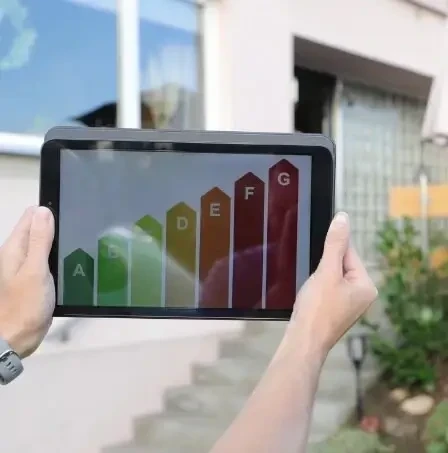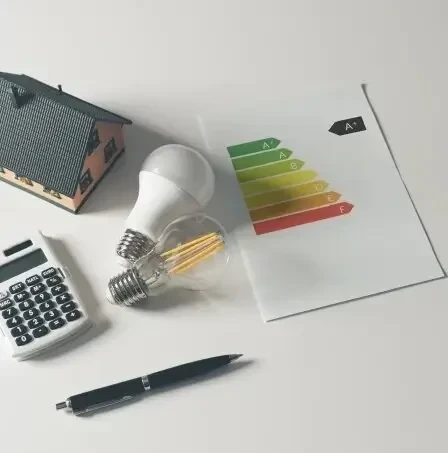Energy Performance Certificates (EPCs) are documents issued by qualified assessors containing information on the energy efficiency of a property. These certificates are legally required for any properties sold or rented in the UK, and they help ensure that buildings are as energy efficient as possible.
The purpose of EPCs is to give buyers, tenants, and occupants a better understanding of how much money they may have to spend on energy bills if they move into a property.
The certificate provides an estimate of the annual cost of heating, hot water and lighting for that particular property and its carbon dioxide emissions rating. This estimated cost can then be compared with other properties to make more informed buying or renting decisions.
EPCs also provide advice on making the property more energy efficient, reassuringly showing examples of the potential savings that could be made if specific measures were taken. Such measures could range from improving insulation levels in walls and roofs to adjusting air conditioning settings or replacing windows with more efficient models.
How EPC Ratings Are Calculated and Interpreted
The energy efficiency of a property is calculated by measuring the amount of energy used to heat, light and cool a home compared to how much energy is required for a ‘standard’ property. The rating is then expressed as two distinct scores—an A-G rating for energy efficiency (A being the most efficient) and an A-G rating for environmental impact (A being the lowest impact).
For those looking to improve their properties, it’s important to understand what each rating means. An 'A' rating indicates that the property has achieved the highest possible level of performance under current legislation. In contrast, a 'G' would indicate that there is potential for considerable cost savings to be made.
It’s important to note that an EPC rating will not change over time, as it reflects the energy efficiency of a property at the time of its assessment. To ensure that the most recent information is available, an EPC should be obtained before any changes are made.
Legally, an EPC must be provided for potential buyers or tenants whenever a property is marketed for sale or rent. This includes when a property changes hands privately and through estate agents or other third parties. Even if the owner isn't required to have an EPC at the outset, they must obtain one before any agreement is signed and money exchanged.
EPCs are valid for 10 years from the issue date, and prices depend on your location in the UK. Having an up-to-date EPC is an important step in selling or renting your property, and it will help any potential buyers or tenants make more informed decisions.
Engaging a DEA is the best way to ensure your certificate is produced quickly and accurately. With this knowledge, you can confidently move forward with understanding how energy efficient your building is – and what you can do to improve it.

What to Expect During the Assessment
When preparing for an EPC assessment, it is essential to ensure that all relevant information is readily available. This includes details of any recent changes made to the property, such as insulation upgrades or new windows.
It may also be helpful to provide photographs or diagrams of the property and any relevant documents like energy bills or invoices for repairs or improvements made. These items will help the assessor better understand how efficient the building is and how potential upgrades could impact its energy performance in the future.
During the visit, the assessor will inspect key areas of the property that affect energy performance, such as walls, roofs, windows and doors. They may also take measurements and readings from appliances and heating systems to identify any potential issues or areas that could benefit from improvement.
The EPC assessor will then create a report incorporating all of this information which will be used to generate an overall rating for your property’s energy efficiency and environmental impact. The assessor will also advise on what measures can be taken to make your home more efficient, considering both cost and benefit analysis purposes.
Once completed, you will have access to your report within 24 hours. This is the case with Energy Performance Certificates; however, other assessors might take five days.

How to Find an EPC Provider
When you are looking to find an EPC for your property, one of the best ways is to engage a professional Domestic Energy Assessor (DEA). DEAs have been accredited by industry bodies and must adhere to strict codes of practice when conducting their assessments. They can also advise on how best to improve your property's energy efficiency rating.
By obtaining an EPC and heeding the advice of a DEA, you can be certain that any potential buyers or tenants of your property will know exactly what they are getting into. It also ensures that your home is as energy efficient as possible, allowing you to save money on bills in the long run.
It’s important to choose an assessor that is properly accredited and experienced in assessing your property type. Ideally, they should also have good knowledge of local building regulations and codes as this will help them advise you on measures to improve your property’s energy efficiency rating.
If you’re looking to get an EPC for a property, search no further than Energy Performance Certificates. We have a team of highly qualified assessors who can issue EPCs for both domestic and commercial properties.
Place your EPC request online and select your property type to get started. One of our assessors will connect with you within two business days. They will confirm your details and schedule your inspection. You may also contact us today for a free quote.
